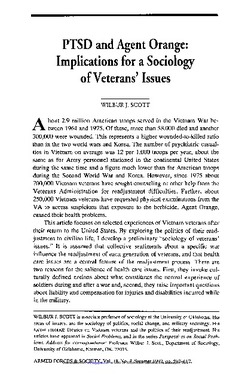| dc.contributor.author | Wilbur J. Scott | |
| dc.date.accessioned | 2016-01-14T19:52:51Z | |
| dc.date.accessioned | 2016-03-30T15:37:03Z | |
| dc.date.available | 2016-01-14T19:52:51Z | |
| dc.date.available | 2016-03-30T15:37:03Z | |
| dc.date.issued | 1992-07-01 | |
| dc.identifier.citation | Scott, W. J. (1992). PTSD and Agent Orange: Implications for a Sociology of Veterans' Issues. Armed Forces & Society, 18(4), 592-612. doi: 10.1177/0095327x9201800409 | en_US |
| dc.identifier.uri | https://hdl.handle.net/11244/24935 | |
| dc.description.abstract | Two major controversies have marked the readjustment of Vietnam veterans to civilian life. The first surrounds the introduction of the diagnosis, Posttraumatic Stress Disorder, into the American Psychiatric Association's Diagnostic and Statistical Manual. The second concerns the debate over harmful effects on veterans of an herbicide widely used by the U.S. military in Vietnam, Agent Orange. Following a constructivist approach to social problems and disease, this article describes the politics of the two controversies and provides a preliminary "theory" for making sense of veterans' issues. | en_US |
| dc.language.iso | en_US | en_US |
| dc.publisher | Armed Forces & Society | |
| dc.title | PTSD and Agent Orange: Implications for a Sociology of Veterans' Issues | en_US |
| dc.type | Research Article | en_US |
| dc.description.peerreview | Yes | en_US |
| dc.description.peerreviewnotes | https://us.sagepub.com/en-us/nam/manuscript-submission-guidelines | en_US |
| dc.identifier.doi | 10.1177/0095327x9201800409 | en_US |
| dc.rights.requestable | false | en_US |
